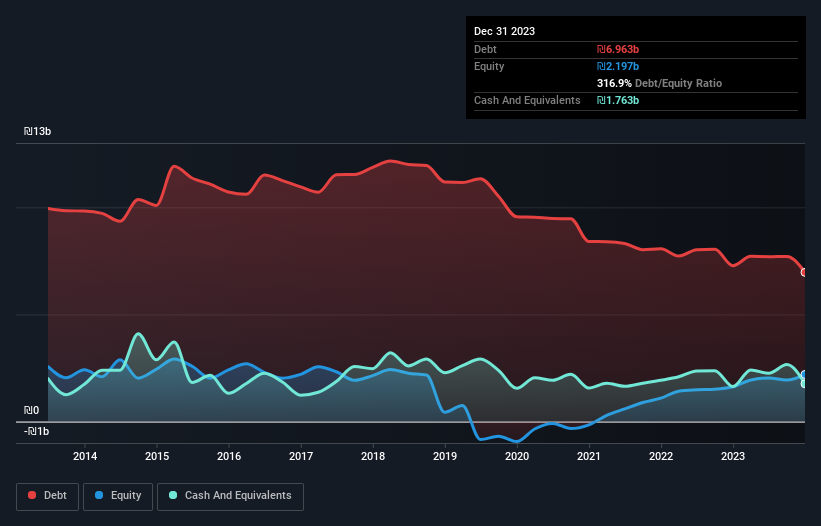- Israel
- /
- Telecom Services and Carriers
- /
- TASE:BEZQ
Bezeq The Israel Telecommunication (TLV:BEZQ) Seems To Use Debt Quite Sensibly

Warren Buffett famously said, 'Volatility is far from synonymous with risk.' It's only natural to consider a company's balance sheet when you examine how risky it is, since debt is often involved when a business collapses. Importantly, Bezeq The Israel Telecommunication Corp. Ltd (TLV:BEZQ) does carry debt. But should shareholders be worried about its use of debt?
When Is Debt Dangerous?
Debt assists a business until the business has trouble paying it off, either with new capital or with free cash flow. In the worst case scenario, a company can go bankrupt if it cannot pay its creditors. While that is not too common, we often do see indebted companies permanently diluting shareholders because lenders force them to raise capital at a distressed price. Of course, debt can be an important tool in businesses, particularly capital heavy businesses. The first step when considering a company's debt levels is to consider its cash and debt together.
See our latest analysis for Bezeq The Israel Telecommunication
What Is Bezeq The Israel Telecommunication's Debt?
The image below, which you can click on for greater detail, shows that Bezeq The Israel Telecommunication had debt of ₪6.96b at the end of December 2023, a reduction from ₪7.27b over a year. On the flip side, it has ₪1.76b in cash leading to net debt of about ₪5.20b.

How Healthy Is Bezeq The Israel Telecommunication's Balance Sheet?
We can see from the most recent balance sheet that Bezeq The Israel Telecommunication had liabilities of ₪3.68b falling due within a year, and liabilities of ₪8.00b due beyond that. Offsetting this, it had ₪1.76b in cash and ₪1.58b in receivables that were due within 12 months. So its liabilities outweigh the sum of its cash and (near-term) receivables by ₪8.34b.
This deficit is considerable relative to its market capitalization of ₪13.4b, so it does suggest shareholders should keep an eye on Bezeq The Israel Telecommunication's use of debt. Should its lenders demand that it shore up the balance sheet, shareholders would likely face severe dilution.
In order to size up a company's debt relative to its earnings, we calculate its net debt divided by its earnings before interest, tax, depreciation, and amortization (EBITDA) and its earnings before interest and tax (EBIT) divided by its interest expense (its interest cover). The advantage of this approach is that we take into account both the absolute quantum of debt (with net debt to EBITDA) and the actual interest expenses associated with that debt (with its interest cover ratio).
Bezeq The Israel Telecommunication's net debt to EBITDA ratio of about 1.7 suggests only moderate use of debt. And its strong interest cover of 10.2 times, makes us even more comfortable. The good news is that Bezeq The Israel Telecommunication has increased its EBIT by 3.6% over twelve months, which should ease any concerns about debt repayment. When analysing debt levels, the balance sheet is the obvious place to start. But it is future earnings, more than anything, that will determine Bezeq The Israel Telecommunication's ability to maintain a healthy balance sheet going forward. So if you want to see what the professionals think, you might find this free report on analyst profit forecasts to be interesting.
But our final consideration is also important, because a company cannot pay debt with paper profits; it needs cold hard cash. So the logical step is to look at the proportion of that EBIT that is matched by actual free cash flow. During the last three years, Bezeq The Israel Telecommunication generated free cash flow amounting to a very robust 84% of its EBIT, more than we'd expect. That positions it well to pay down debt if desirable to do so.
Our View
The good news is that Bezeq The Israel Telecommunication's demonstrated ability to convert EBIT to free cash flow delights us like a fluffy puppy does a toddler. But, on a more sombre note, we are a little concerned by its level of total liabilities. Looking at all the aforementioned factors together, it strikes us that Bezeq The Israel Telecommunication can handle its debt fairly comfortably. On the plus side, this leverage can boost shareholder returns, but the potential downside is more risk of loss, so it's worth monitoring the balance sheet. There's no doubt that we learn most about debt from the balance sheet. However, not all investment risk resides within the balance sheet - far from it. We've identified 3 warning signs with Bezeq The Israel Telecommunication , and understanding them should be part of your investment process.
Of course, if you're the type of investor who prefers buying stocks without the burden of debt, then don't hesitate to discover our exclusive list of net cash growth stocks, today.
Valuation is complex, but we're here to simplify it.
Discover if Bezeq The Israel Telecommunication might be undervalued or overvalued with our detailed analysis, featuring fair value estimates, potential risks, dividends, insider trades, and its financial condition.
Access Free AnalysisHave feedback on this article? Concerned about the content? Get in touch with us directly. Alternatively, email editorial-team (at) simplywallst.com.
This article by Simply Wall St is general in nature. We provide commentary based on historical data and analyst forecasts only using an unbiased methodology and our articles are not intended to be financial advice. It does not constitute a recommendation to buy or sell any stock, and does not take account of your objectives, or your financial situation. We aim to bring you long-term focused analysis driven by fundamental data. Note that our analysis may not factor in the latest price-sensitive company announcements or qualitative material. Simply Wall St has no position in any stocks mentioned.
About TASE:BEZQ
Bezeq The Israel Telecommunication
Provides communications services to business and private customers in Israel.
Good value with adequate balance sheet.
Similar Companies
Market Insights
Community Narratives



